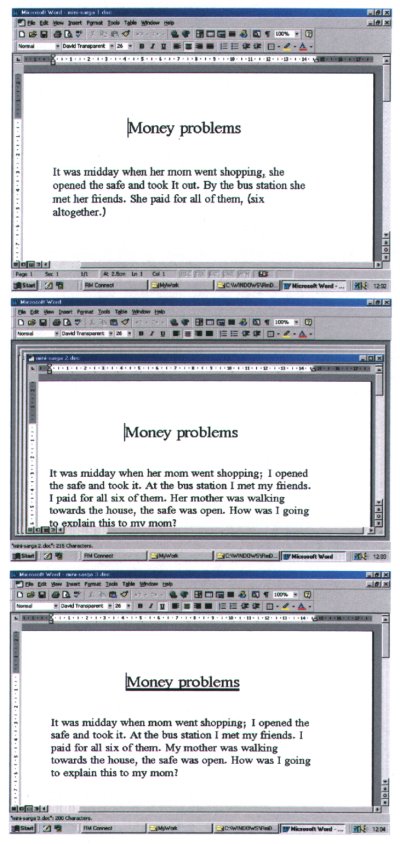| You are here: Home ... Case Studies ... English | ||
English KS2 (Y6) : Narrative Writing mini-sagas Activity Description The teacher introduced the pupils to four types of story ending using presentation software with a projector. These were:
He asked for examples of each of the four types identified. The pupils suggested the films 'Batman' (open ending) and 'The Sixth Sense' (unexpected ending), and the stories 'The Tortoise and the Hare' (closed ending with a moral) and 'Noah's Ark' (cyclical ending). The teacher asked the pupils to write open endings on whiteboards for Noah's Ark. He then showed examples of endings from other stories using the presentation software and asked the pupils to classify each ending into one of the four types. Next, the teacher asked the pupils to write their own mini-saga, using a maximum of 50 words. He suggested that they should type up their story on the computer first and then edit it on-screen to the appropriate length. He showed an example to the group and reminded them about the spellchecker and word-count tools. The pupils worked in pairs at their computers. They were later brought back together and invited to read out from their printed copies. The teacher concluded the lesson by linking the activity to earlier work the pupils had done on story beginnings. He stressed that they needed to think about endings as well as beginnings when they composed narratives. In a further lesson, all the mini-sagas were transferred on to a shared document so they could be shown on a big screen and then edited jointly, with the pupils identifying how clauses could be moved around. The work also involved the pupils creating cloze tests for each other using their mini-sagas. ICT resource used:
Activity Objectives
Commentary: Using ICT Word-processing software enabled the pupils to manipulate text easily. The opportunity to network meant that they could share their work and edit it as a whole class or in pairs. The pupils could see their drafts at different stages, which helped them reflect on the process of writing and editing. Using word-processing software helped Jane and Nicole to produce several drafts quickly. They completed the first draft (32 words) within 10 minutes. They completed the second draft (51 words) within five minutes, making corrections to the grammar, style and length. They completed the final copy in another five minutes, reaching their target length of 50 words.
First, second and third drafts of the mini-saga This case study is taken from the NC Action website |
||


